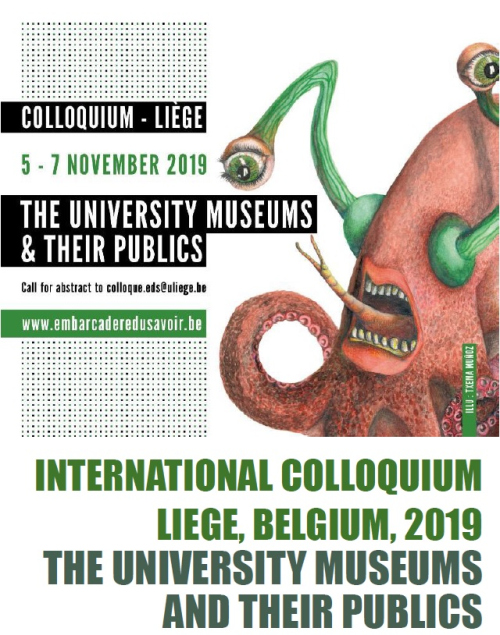Call for Papers
Call for Papers for the international colloquium „The University Museums and their publics“
Organized by the Embarcadère du Savoir and the Museology Seminar of the University of Liège

The Embarcadère du Savoir and the Museology Seminar of the University of Liège associate for organizing an international colloquium on the university museums publics. This event will take place from 5 to 7 November 2019 in Liège (Belgium).
CALL FOR PAPERS
From November 5th to 9th 2019, the Embarcadère du Savoir and the Museology Seminar of the University of Liège organize the University Museums and their Publics colloquium in Liège (Belgium). Researchers and museum professionals are invited to submit abstracts for oral contribution. The peer-review accepted contributions would be included into the conference proceedings. During the colloquium, afternoons will be dedicated to contributions being selected by the scientific committee. They will last 15 minutes plus discussion each and should address one of the following topics:
- How is that the public does not visit university museums? This question aims in emphasizing the reasons why non-university public is reluctant to enter university museums. Several aspects can be considered: socio-economic criteria or level of study of the public; lack of visibility or latent elitism of the museum; feeling of lack of legitimacy by the public; non-efficient reception equipment (PRM, stroller, young children...), etc.
- What means of communication are suitable for the university museums public? Exhibitions, mediation and animation means, scenography, topics, large audience communication (promotional campaign and selected media, exhibition title and topics, building architecture...). These are all modes of communication that are likely to support or to reject the self-confidence of the visitor.
- Can the university museum be a place for demonstrating the academic research? Are there favorite places and ways to introduce and spread scientific results to the general public? How to induce vocations for young people? How to arouse critical thinking about contemporary controversies (ecology, environment, food, astronomy, medicine...) through the museum experience? Is the museum the ideal site to disseminate the skills arising from the university (controversies, new and old discoveries, knowledge of collections...)? Some museums take the bet of exposing current research through more or less original means.
- University museum marketing: is it a potential showcase for universities? Do university authorities find in their museums a good way to promote their institution and to polish up its image? Is it an effective activity to attract new students or future (economic) partners? On the contrary, do universities voluntarily forsake the past heritage in order to focus the communication on the recent research they conducted? Links must be drawn between theses issues and the policy of audience management applied by the institution.
- What kind of expography for university museum? The dichotomy between academic versus external visitors of the university museums is responsible for difficulties in establishing a museum discussion that meets these supposedly antagonist needs. How to simultaneously meet the needs of individuals/families and those of students and researchers who visit the museum as part of their university careers of courses?
- How to ensure social and cultural inclusion in university museums? At first, the idea of inclusion seems to relate to the physical accessibility to the museums and the exhibitions (how to guarantee access to people with physical illness or senior citizen). Yet there are other barriers between museums and society that continue to limit the public the regular visitors, that is, the most educated and both socially and economically privileged. So, how can (university) museums attract a more diverse audience and reduce social and cultural disparities? What types of devices and strategies are able to break the cognitive barrier that gives access to the scientific discourse of the universities? How to ensure that the audience of university museums is more representative of the society as a whole, taking into account those who have not received auniversity education?
- University museums and students/researchers: a place for a formation site. Most of the time, students attend university museums as part of their academic background. But are they invited to perform other kinds of professional experiences in those institutions: internships, practical work, dissertations, PhD with the collection manager as promoter... ?
MODALITY
Researchers and museum professionals (max. 3 authors) are invited to submit abstracts by May 27th, 2019. Abstracts should be addressed to: colloque.eds@uliege.be
The peer-review accepted contributions would be included into the conference proceedings (article submission by January 15th 2020)
Proposals should contain:
1. A title and an optional subtitle;
2. A summary (approx. 300 words);
3. Last/sur Name, First name, affiliation (institution, position, email) of each author
The organizing committee agrees to:
- Acknowledge receipt of your proposal;
- Anonymously send your proposal to the scientific committee in charge of evaluating all the submitted abstracts;
- Bring the final decision of the selection committee to the attention of the authors – and the methods for writing the articles – by June the 15th. Those whose contribution has been accepted would have to send a paper (max. 50.000 characters, blank included) written in English or in French by January the 15th 2020 at last. Proceedings will be published online by 2020.